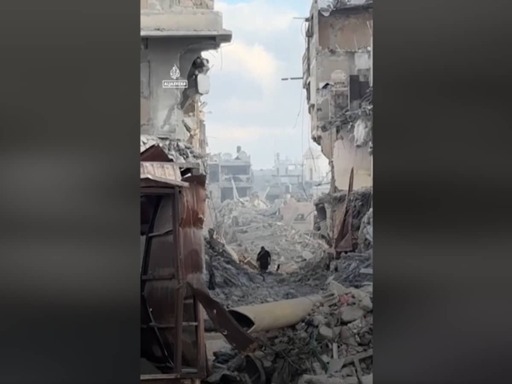The UN Under-Secretary-General for Humanitarian Affairs, Tom Fletcher, warned of the magnitude of the humanitarian disaster in the Gaza Strip, stressing that the scale of the task of recovering bodies from under the rubble of destruction is ‘enormous and beyond the capacity of any single entity to bear alone.’
In a television interview with Al Jazeera from inside the Gaza Strip, Fletcher said that thousands of destroyed buildings and homes ‘hide beneath them the bodies of entire families waiting to be recovered,’ He pointed out that the rubble scattered everywhere makes search and recovery operations ‘complex and extremely dangerous,’ given Israel’s continued restrictions on the entry of heavy equipment and specialised equipment.
The UN official added that many families are still waiting for the recovery of their loved ones’ bodies, stressing that this issue is a ‘purely humanitarian matter’ that must be included in the field commitments of the ceasefire agreement, calling on all parties to cooperate to facilitate the tasks of rescue and relief teams.
An urgent humanitarian priority, says the UN
Fletcher explained that providing the necessary search and rescue equipment is a top priority in the UN plan, stressing that the enormous amount of rubble scattered throughout the destroyed cities makes it impossible to reach victims without significant engineering and technical intervention.
He stressed that the humanitarian response in Gaza is not limited to food and medicine, but also includes ‘restoring dignity to victims by recovering and burying them in a dignified manner.’
Fletcher described the humanitarian situation in the Strip as ‘indescribably difficult,’ saying that the cities he visited had been ‘razed to the ground’ and that the scale of the destruction was ‘beyond imagination.’
He noted that what he saw during his field visits ‘reflects an enormous humanitarian tragedy that calls for broad international solidarity,’ stressing that the United Nations is intensifying its efforts to remove rubble, reopen roads and facilitate the delivery of aid to the besieged population.
He added that the United Nations needs thousands of trucks per week to distribute food, health and educational aid, explaining that about one million meals are currently being distributed to the population despite the severe shortage of resources.
Gaza is on the brink of collapse
Fletcher noted that hospitals in Gaza are operating under enormous pressure and lack fuel, medicines and vital equipment, while hundreds of thousands of children are waiting to return to school as part of a UN plan to gradually restart the education process.
The Deputy Secretary-General spoke about the UN’s 60-day plan following the ceasefire agreement, explaining that it is a ‘comprehensive plan’ aimed at bringing in thousands of trucks loaded with humanitarian supplies and supporting the operation of local bakeries, which have begun producing hundreds of thousands of loaves of bread daily after the arrival of flour, yeast and fuel.
He added that the plan also includes bringing in thousands of tents in preparation for winter, securing fuel for cooking, heating and operating sewage treatment plants, as well as rehabilitating hospitals and schools and providing them with basic educational supplies.
Fletcher stressed that ‘the challenge ahead of us is enormous, and rebuilding Gaza requires a long-term vision,’ calling on the international community to shoulder its responsibility, saying, ‘It is time for the world to take serious action to end the suffering in Gaza after years of neglect and isolation.’
With regard to coordinating the entry of aid, Fletcher said that the Israeli side had committed to allowing trucks to cross, and that the United Nations was beginning to see tangible results after the reopening of the Rafah crossing and the start of the actual flow of supplies. However, he stressed the need to open all crossings permanently to ensure the unimpeded flow of humanitarian aid.
He also called for international and Palestinian organisations to be able to work side by side in distributing aid, stressing that local markets are in dire need of basic items such as eggs and daily food products.
The world must act
Speaking about the killing of more than 100 UN employees during the war, Fletcher expressed ‘deep sadness at the loss of colleagues,’ affirming the UN’s commitment to continue its work ‘in honour of their memory’ and stressing that the organisation would maintain its humanitarian presence in the Strip despite the challenges and risks.
Fletcher concluded his statement by emphasising that Gaza must not be left alone to face this destruction, saying that ‘bringing life back to this devastated place is not the responsibility of the Palestinians alone, but a global humanitarian duty,’ calling for genuine and sustained solidarity that will restore hope to millions of civilians who have lost everything.
Featured image via the Canary
By Alaa Shamali
From Canary via this RSS feed


